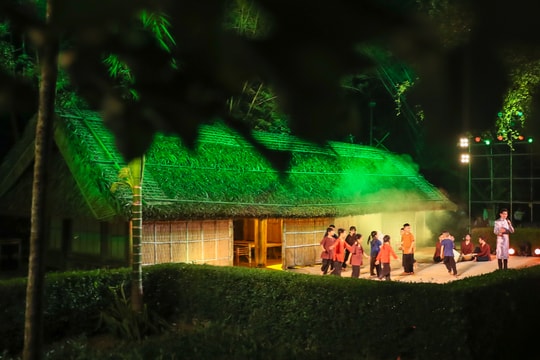Uncle Ho's affection for his homeland Nghe An
(Baonghean.vn) - Leaving to find a way to save the country with the utmost desire to make the country independent, the people free, everyone having food to eat, clothes to wear, and education, Ho Chi Minh always had a deep longing for his homeland.
During his childhood, President Ho Chi Minh was taught the first moral and personality lessons by his father and mother. His paternal and maternal homelands soon instilled and nurtured his patriotism and love for his people. The cradle of family and homeland culture became a source of sweet milk that nurtured and became Ho Chi Minh's spiritual support on his later revolutionary path.
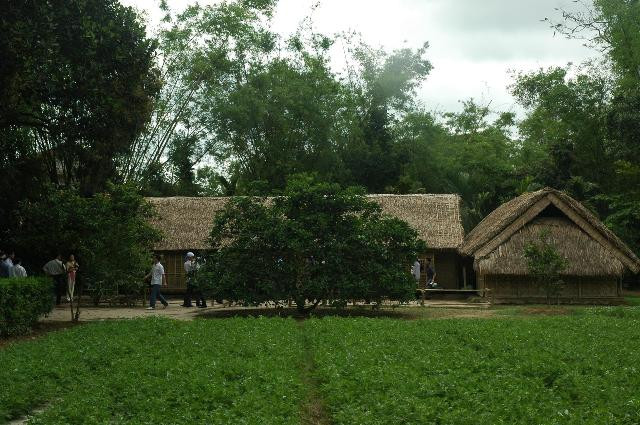 |
| Sen Village - President Ho Chi Minh's paternal hometown, a village filled with the fragrant scent of lotus flowers, is where he lived during his childhood (1901-1906). |
In the family, Mr. Nguyen Sinh Sac had a great influence on Ho Chi Minh, his father had a direct influence with his profound education, a patriotic personality, a deep love for his people, an extraordinary will to achieve the set goals. Nguyen Sinh Sac was a man of great learning and talent, but very modest, did not like formalities and exaggeration. He lived a frugal life, attached and close to the poor working people, was loved and protected by the people and he also lived a life of love and loyalty to them.
President Ho Chi Minh never forgot the lesson of modesty and simplicity of his father and he received and followed that shining example. It can be said that Mr. Nguyen Sinh Sac contributed significantly to building the ideology, morality and personality of Ho Chi Minh - a great personality of our time.
Mrs. Hoang Thi Loan had a positive impact on her children with her simplicity, sacrifice, loyalty, love of life, and patriotism. As a woman who knew a little about the words of the sages, she devoted a lot of effort to imparting to her children the initial understanding of the natural world and society. All of her children's naive and funny questions were answered clearly, thoroughly, and easily understood.
As a hard-working and diligent mother, she taught her children to love work, to do things that were suitable for their strength and age with passion, creativity and diligence. That simple, noble lifestyle and love of work were clearly reflected in Ho Chi Minh's later life.
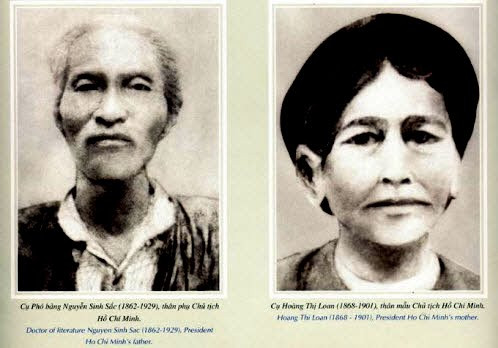 |
| Vice-Chancellor Nguyen Sinh Sac and Mrs. Hoang Thi Loan.. |
As for Ho Chi Minh, the influence of his mother was expressed through a folk culture imbued with local identity and national traditions, honestly reflecting the aspirations, wishes and qualities of the working class. She set a shining example of moral character for her children to learn from. Wherever she went, she demonstrated a pure, meaningful and affectionate lifestyle, loved and respected by everyone.
With the heart and sensitivity of a mother, she cultivated, shaped, and taught her children the first lessons about how to live, about morality in life, and being a human being. Therefore, right from childhood, her good children knew how to say good things, do good deeds, respect their elders, live in harmony with friends, be forgiving, benevolent, and know how to yield to everyone. All of those good qualities and virtues accompanied Ho Chi Minh throughout his life, enriched, deepened, and multiplied by him.
In addition, Ho Chi Minh's childhood was also nourished by folk songs, lullabies, and songs full of love for the country. Activities such as reciting Kieu, telling fairy tales, and singing the fabric guild by his grandmother, aunt An, and neighbors deeply imprinted on his soul, nurturing his childhood with good thoughts and feelings for the workers and his homeland.
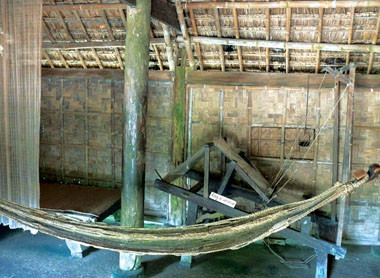 |
| Hoang Tru village is where Uncle Ho was born, where there is a hammock where he lay listening to his mother, Hoang Thi Loan, weave and sing lullabies, rocking him to sleep. |
Those feelings were cultivated from childhood, over the years, permeated every patriotic thought and action of Cung, and were increasingly nurtured and enhanced, creating a solid foundation for the ideology of valuing and cherishing national culture and arts - a precious source that is never exhausted.
Thus, from the family environment, through the example of his blood relatives, Nguyen Sinh Cung was not only taught knowledge about life, felt nature to love his village, love his country, love the national historical tradition, but was also taught very carefully how to behave and be a human being. The personality of the great cultural figure Ho Chi Minh originated from there.
For his hometown Nghe An, President Ho Chi Minh always had special affection and care. As an outstanding son of his homeland, during the process of leading the revolution, despite being busy with many tasks, even when he was sick, he always paid attention to the revolutionary movement of his home province. He had 34 articles, letters, telegrams, and speeches to the Party Committee and people of Nghe An province from the 1930s to July 1969. Sometimes he "used the name of an old comrade" to share experiences, sometimes he used the name of the President to meet and visit, or send letters of encouragement and guidance.
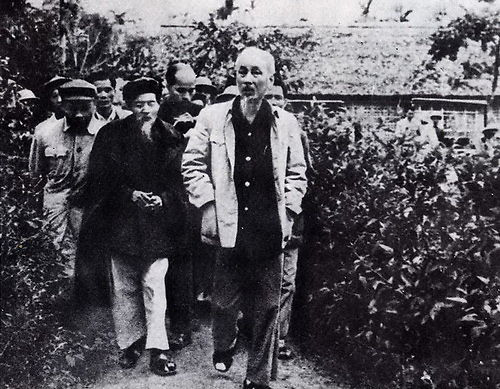 |
| Uncle Ho visited his homeland for the first time in 1957. |
Every time Nghe An cadres came to the Central Committee for a meeting, or Central cadres returned from working in Nghe An, he often met and inquired about the local situation. He was very pleased to see the revolutionary movement in his province progress and promptly rewarded localities and units with outstanding achievements. But he also very strictly criticized and kindly taught us when we made mistakes.
We are very proud to re-read the report he sent to the Eastern section of the Communist International about the revolutionary tradition of Nghe Tinh nearly a century ago, and also moved to see the first letter he sent to "Comrades of the province" less than a month after the successful August Revolution. He advised: "While working, if there are any problems that are difficult to solve, comrades, please write to me to discuss, I am ready to help with opinions" and from then on, he often sent letters to inquire, remind the Party Committee and people of the province to unite, love, and encourage each other to enthusiastically participate in the resistance war and national construction to be worthy of the heroic Soviet tradition.
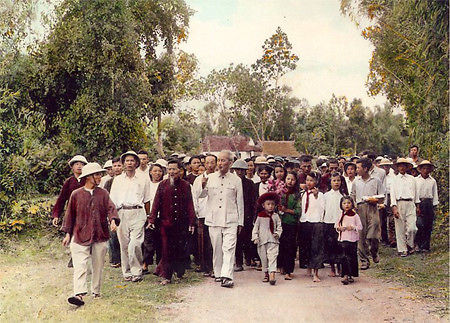 |
| People of Sen village, Kim Lien commune welcomed President Ho Chi Minh on his return to his hometown. |
During his two visits to his hometown, he personally visited, encouraged and advised the Party Committee and the people of his hometown with great care and affection. Especially before his death, on July 21, 1969, he also sent a letter to the Provincial Party Committee, instructing the things that he always cared about for his hometown and asked the Provincial Party Committee to convey his wishes to all the compatriots, soldiers, cadres, party members and union members in the province for good health and progress. This is the last letter that has the value of his sacred will to his hometown.
Today, the country has entered a new revolutionary stage, the ideological and cultural values as well as the teachings of President Ho Chi Minh for the Party Committee and the people of the province are more practical than ever. Cadres, Party members and people of the province should study, follow his example and remember his teachings, determined to build Nghe An into a model province as President Ho Chi Minh always wished during his lifetime.
Peace
(Synthesized according to VNA)
| RELATED NEWS |
|---|

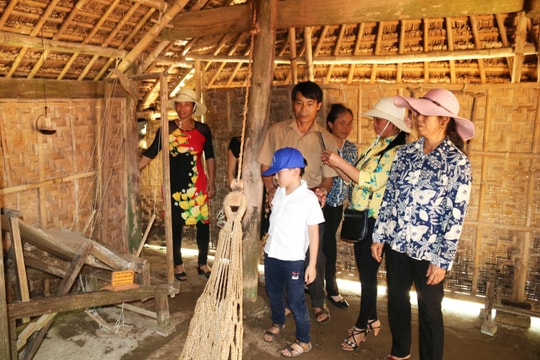
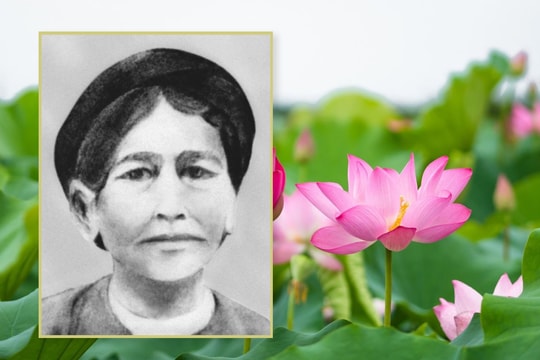
.jpg)
